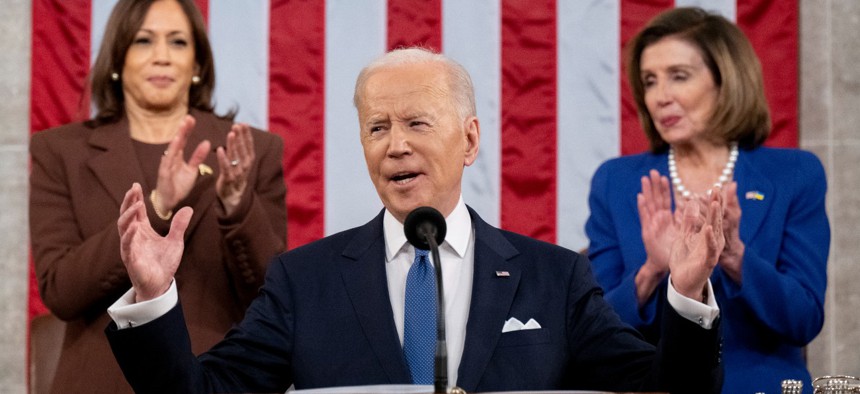Biden uses the State of the Union to call feds back to the office

Pool/Getty Images
The president lays out new tasks for agencies in his address, along with ideas for where that work should take place.
President Biden on Tuesday laid out an agenda of aggressive reforms for federal agencies during his first formal State of the Union address, including where their employees will conduct their work and the role watchdogs will play in overseeing it.
Biden revisited many familiar priorities, including reforming the tax code, building infrastructure and defeating the COVID-19 pandemic, but also laid out new efforts agencies will undertake. He called on federal workers to lead by example in demonstrating how America is returning to normal, including by returning their offices after two years of widespread remote work.
The president spelled out new programs for a number of specific agencies as he seeks to implement what he called “a unity agenda for the nation.”
Biden announced new initiatives for the Veterans Affairs Department, including resuming service connection for various types of cancer tied to burn pits, relieving some veterans of their medical debt and boosting assistance for job training and housing. While Biden called for increased funding to law enforcement, he also said they must be held accountable, highlighting that the Justice Department has required body cameras for its agents, banned chokeholds and restricted no-knock warrants. As he put forward in his budget last year, Biden called on Congress to launch the Advanced Research Projects Agency for Health (ARPA-H) to further cancer, diabetes and Alzheimer’s research.
The president also boasted of his administration's efforts to implement "buy American" provisions, highlighting that federal agencies will use their buying power to procure goods manufactured in the United States. He signed an early executive order to create a Made in America Office within the White House and subsequently created an interagency council aimed at boosting domestic manufacturing through procurement.
“Every administration, Democrat and Republican, says they’ll do it, but we are actually doing it,” Biden said.
Over the last two years Congress has authorized trillions of dollars for agencies to spend on COVID-19 relief, and Biden laid out a plan to crack down on fraud in initiatives such as the Paycheck Protection Program and unemployment insurance. Justice has already set up a task force to investigate potential malfeasance, but it will now add a chief prosecutor to lead “strike force teams” of federal prosecutors and agents. The Pandemic Response Accountability Committee—made up of various agency inspectors general—is part of the interagency task force with 30 agencies that oversees pandemic relief funding and has so far brought more than 1,000 criminal charges. Biden also announced a Justice task force to “go after the crimes of Russian oligarchs.”
“In my administration, the watchdogs are back," Biden said, taking a shot at President Trump’s checkered record with inspectors general and government oversight generally.
Biden laid out other steps to combat the pandemic, including allowing Americans to order more at-home COVID-19 tests through the U.S. Postal Service. He noted the Health and Human Services Department has already coordinated with USPS to deliver hundreds of millions of tests.
Ahead of his speech, Biden released a letter thanking federal employees for their dedication to the country. He cited their work on the pandemic, climate change, racial equity and national security, saying advances in those areas would not have been possible without civil servants.
‘The strength of any organization rests in its people,” Biden said. “Your capabilities and dedication are what make the federal government strong and ensure we deliver the basic needs for everyday Americans.”
He said in the coming months federal agencies will “build on the innovation and technologies” rolled out during the last two years, which will make government more “efficient, resilient and effective.” He also hinted that agencies will continue to recall staff back to their normal workstations, saying the government will “lead by example” in safely increasing in-person work and showing a path forward for the rest of the country. Many agencies around the country that initially sent employees home to work remotely have begun bringing them back to the office and most have said they will ramp up those efforts this spring.
“People working from home can feel safe to begin to return to the office,” Biden said during his speech. “We’re doing that here in the federal government. The vast majority of federal workers will once again work in person.”
Tony Reardon, president of the National Treasury Employees Union, thanked Biden for his letter and said his words of praise did not go unnoticed. He stressed, however, that many federal employees never left their normal duty stations during the pandemic and others have already begun going back to their offices.
“NTEU is heavily involved in that process including working to permanently expand telework options for federal workers,” Reardon said. “Just as President Biden said in his letter, federal employees have not allowed a pandemic to stop progress on the economic recovery, protecting national security and helping our federal agencies accomplish their important missions.”
Everett Kelley, president of the American Federation of Government Employees, similarly vowed to negotiate over telework and return to workplace policies. He praised Biden for expanding federal employees' collective bargaining rights, as well as for boosting pay and restoring civil service protections that Trump had revoked.






